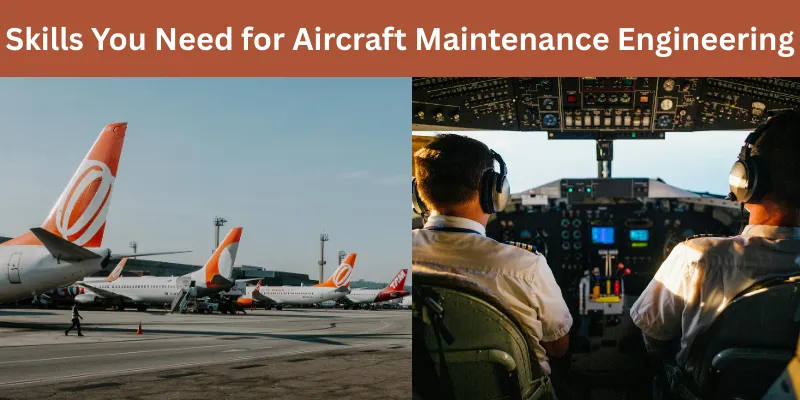

Aircraft maintenance engineering means more than just fixing plane parts. It’s a role full of responsibility, careful attention, and smart problem-solving, all in a high-pressure setting where safety matters most.
As we move ahead, we’ll explore some unique, lesser-known skills that make a great aircraft maintenance engineer stand out.
When you hear "aircraft maintenance," you might picture someone fixing parts. But there’s much more behind the scenes. Modern aircraft are complex machines that need advanced systems and skilled minds to stay safe in the sky.
Let’s explore why aircraft maintenance is more exciting and vital than it seems.
Mastery of Aircraft Systems
Aircraft maintenance engineers do more than fix issues—they understand every aircraft system. From avionics and hydraulics to propulsion, they know how each part works together. This deep knowledge lets them spot and prevent problems early.
Diagnostic and Troubleshooting Expertise
Modern aircraft have advanced tech, but still wear down. Maintenance engineers use tools and experience to find the true cause. This is root-cause analysis — not quick fixes, but finding the “why” behind issues to keep flights safe long-term.
Staying Updated with Evolving Technology
Aviation keeps evolving—and so do its tools. Today’s aircraft rely on digital sensors, AI, and smart diagnostics for better safety and performance. Engineers must keep learning. From tablet inspections to software simulations and AI alerts, modern maintenance is driven by technology as much as traditional tools.
In the world of aircraft maintenance, precision is everything. A small mistake can lead to big problems. That’s why engineers need sharp eyes and steady hands every single day.
Attention to Detail: Every Nut, Bolt, and Data Log Matters
In aircraft maintenance, nothing can be overlooked. Every bolt, checklist item, and sensor reading must be verified. Even minor errors risk flight safety. Skilled engineers don’t just look — they inspect closely, listen for issues, and analyze data to catch problems early.
Manual Dexterity: Skilled Hands That Save the Day
Aircraft parts are small, complex, and tightly placed, requiring skilled, steady hands to fix. This manual dexterity is crucial, especially under pressure. In real cases, engineers have averted major failures by replacing hidden wires or adjusting valves just in time—proving the value of hands-on skill.
In high-pressure fields such as aviation or tech maintenance, quick and smart thinking is key. Critical thinking helps you stay calm, solve problems, and make informed decisions under stress.
Rapid Decision-Making in High-Stress Situations
You're working on an aircraft set to fly in 30 minutes when a warning light flashes. There's no time to waste — you must act fast, assess the issue, and make a smart, safe decision.
This is thinking on your feet: clear, quick decisions under pressure.
These aren't guesses — they rely on your training, experience, and critical thinking to understand the problem, consider options, and choose the best solution quickly.
Creative Problem Solving
Sometimes, the issue isn’t what you expect — a part might be missing or a tool breaks. You can’t stop. You must think creatively and solve it safely with what’s available.
Critical thinking helps you stay calm and ask:
When we think of maintenance, we usually picture tools and technical skills. But strong communication—often overlooked—is just as vital. In aircraft maintenance, it can be the difference between smooth operations and serious issues.
Clear Reporting and Documentation
Aircraft maintenance demands precise documentation—clear, accurate records are key to effective communication.
What’s included?
Team Coordination
Communication isn’t just writing—it’s also teamwork, especially in aircraft maintenance.
Who do maintenance engineers talk to?
Flying isn’t just about engines and wings — knowing air rules is equally vital. These rules ensure safety for everyone. If you want an aviation career, understanding regulations is essential.
Deep Understanding of Aviation Safety Standards
Safety in aviation doesn’t happen by accident. It’s built on strict standards that every engineer, pilot, and airline must follow. These safety standards cover everything — from how a plane is maintained to how it should be inspected before takeoff.
Ethical Responsibility
Different regions follow their own aviation rules, but all aim for safe skies.
Aviation professionals often need to understand multiple standards, especially when working with international airlines or global maintenance firms.
Time Management and Discipline
Aircraft maintenance often emphasizes tools and technical skills, but behind every safe flight is someone with strong soft skills. These human qualities ensure smooth operations, even under pressure. Let’s look at two key soft skills that help engineers excel.
Adaptability and Lifelong Learning
Aviation runs on tight schedules — even small delays impact hundreds. That’s why aircraft maintenance engineers must manage time well and stay disciplined.
Punctuality isn’t optional it’s critical for safety and success. Engineers must follow checklists, plan tasks precisely, and meet strict deadlines. Every minute matters.
Aircraft maintenance engineering needs more than technical skills — it’s a mix of sharp thinking, steady hands, strong values, and real care. If you’re dreaming of this path, start building these skills now.
Remember, true aviation heroes don’t fly the plane — they keep it safe and ready, every single time.